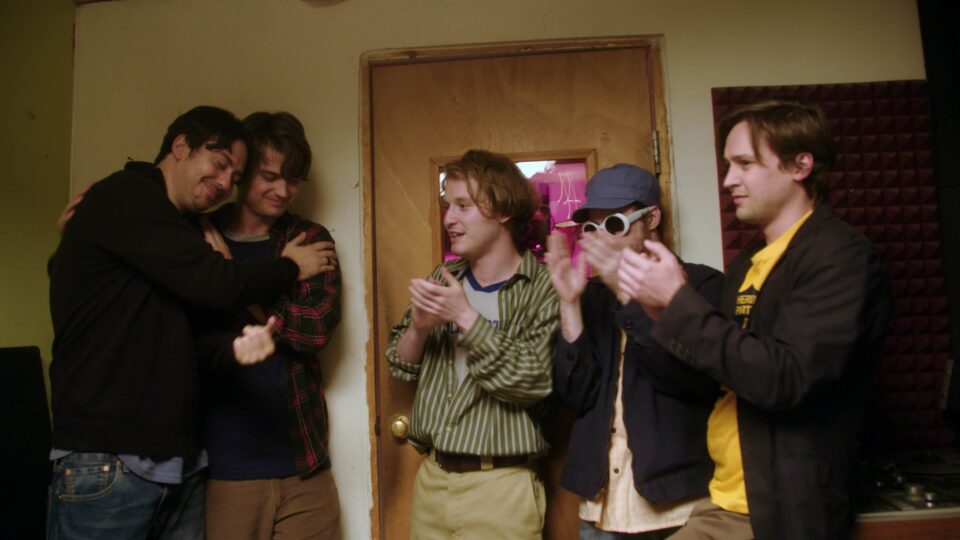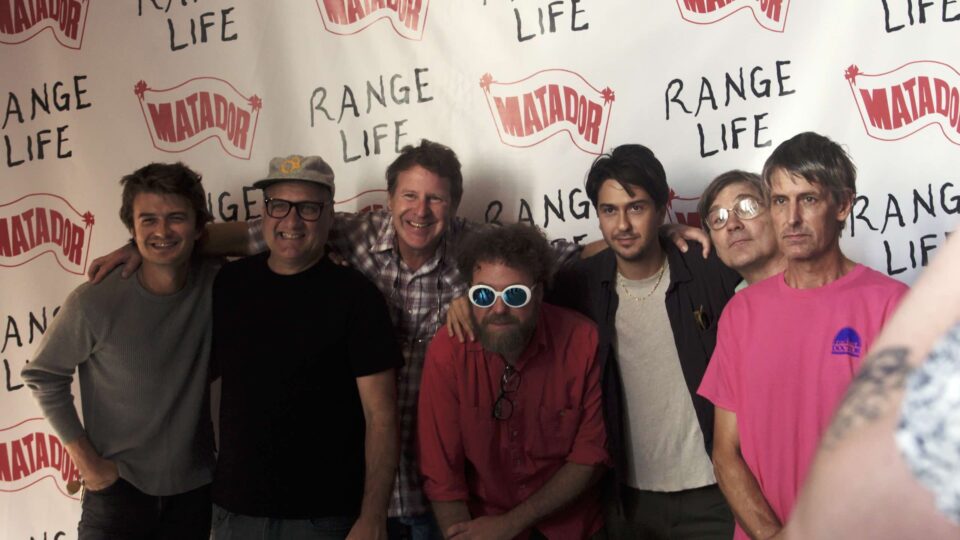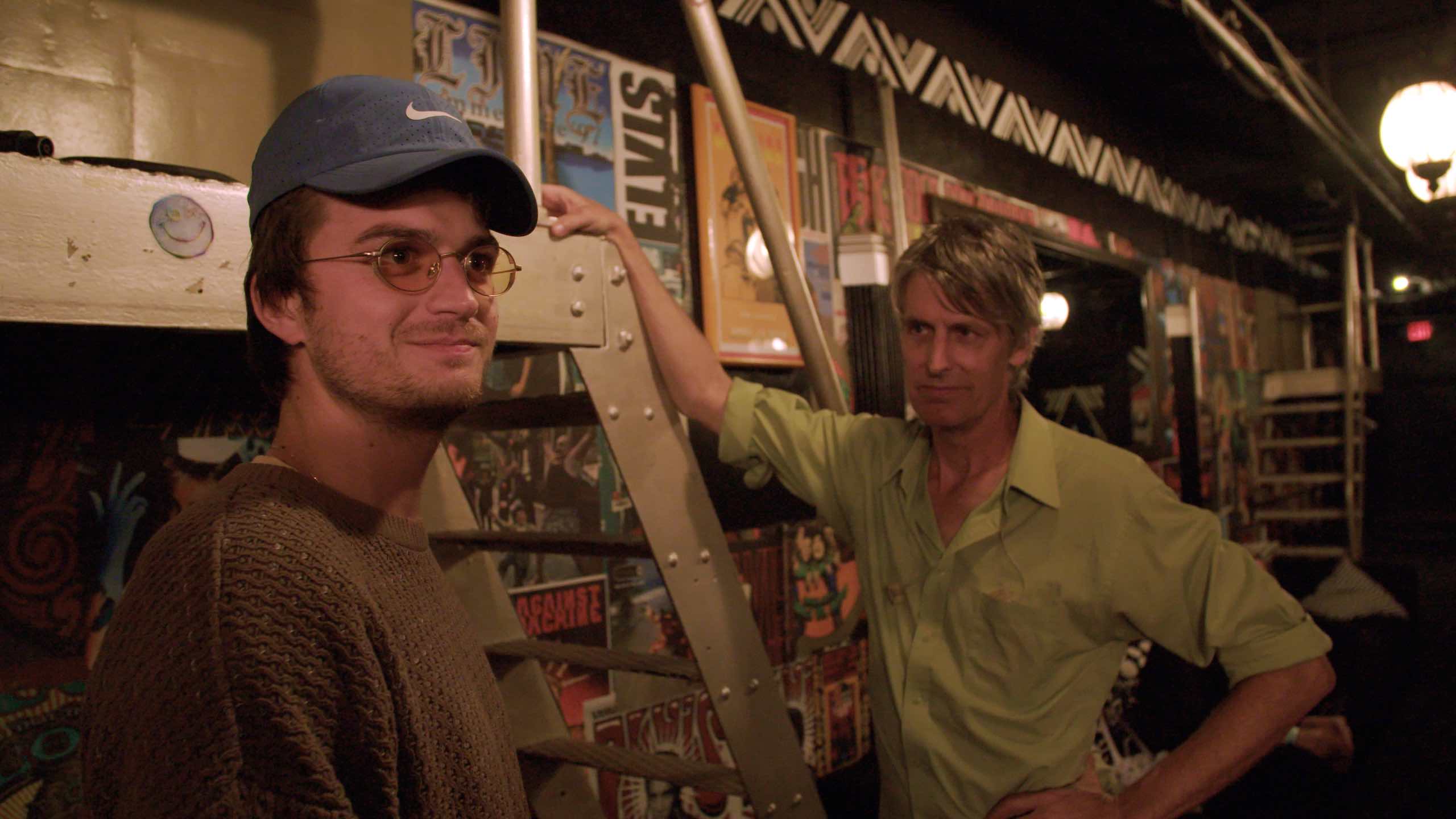Where do we fall on Pavement, culturally? I mean, they’re still cool, right? If they are, is it despite or because of their longstanding place as slacker icons to a certain type of indie-rock lifer? Even if Pavement is still cool, has liking—even loving—Pavement become just a bit lame? Or are they only a decidedly uncool person’s idea of a cool band, rendering them lame by association? I love Pavement, even if it is easy to imagine the worst guy in the world sharing that opinion. You know the type, a guy—or girl, but, you know, probably guy—for whom “cool” is something to prove, a cudgel with which to intimidate the woefully uncool; the kind of guy who would prefer his passions remain his and his alone.
This imagined totem of Pavement fandom would fit wonderfully into the world of Alex Ross Perry, a screenwriter and director whose depictions of the utterly insufferable has no parallel. Over the course of his 16-year career, Perry has introduced us to a whole host of prickly, neurotic creatives who test the viewer’s tolerance for the impenetrable, people whose instinct to keep everyone at arm’s length begins to feel like a blessing for all involved. His latest subject, Pavement—and the man and myth at its center, Stephen Malkmus—might not be quite as unbearable as all that, but if Perry’s untraditional depiction of the band teaches us anything, it’s that truly understanding his characters might be beside the point. “I can’t answer anything about why he is the way he is, and I don’t care to, either,” Perry tells me over Zoom ahead of the wide release of Pavements. “He’s inscrutable, he’s complicated, and to try to break that down into easily understandable storytelling devices would be completely false.”
“Completely false” is an interesting choice of phrasing here, as unpacking Perry’s film means leaving the notions of strict truth at the door. Pavements is, from top to bottom, an exercise in contradictions. It is simultaneously a documentary that isn’t true, a biopic that isn’t real, a musical that isn’t at all serious, and a look at a museum that doesn’t exist. Above all, it’s a film that weaves these contradictions into something that aims at the vicinity of truth, perhaps better than most traditional films could ever hope to.
Let’s start with the biopic portion, the most patently false and perhaps most engaging of any of Pavements’s sections. The modern biopic is one of the most reliable industries in film, as evidenced by modern Oscar juggernauts A Complete Unknown, Bohemian Rhapsody, and Elvis. Perry’s relationship to these movies is predictably complicated. At best, he views them as largely harmless B-minus efforts at canonization; at worst, they’re Back to Black, the “borderline insulting” Amy Winehouse movie released last year. Still, Perry was inspired by all of these when putting together Range Life, the film-within-a-film that aims to give Pavement the big-budget biopic treatment they kinda sorta deserve. In giving us both the content and context of Range Life, Perry aims to deconstruct and highlight the absurdity and, to a lesser but not non-existent degree, the joy of such an endeavor.
“Letting the viewer sort of just marinate with [Malkmus]—in depictions of him, in representations only of his lyrics, of his melodies—that, to me, is the greatest way to try to study a subject.”
One of the best bits sees Range Life star Joe Keery preparing with Chalamet-ian earnestness for his role as Malkmus by studying the inner workings of Malkmus’ mouth and refusing to be referred to as anything other than “Stephen.” Later on we get a chance to see scenes from the film proper, the kind of highly dramatized, mostly fabricated moments of conflict that usually make up these sorts of biopics. The best of these include Tim Heidecker and Jason Schwartzman as Matador label managers Gerard Cosloy and Chris Lombardi, the stuffy business types stifling Malkmus’ detached cool-man routine by suggesting that the three-sided Wowee Zowee is not commercial and playing SNL might be a good career move. Almost none of this is real and most of it isn’t true, but it is entertaining in a trite and reductive way—a fact Perry seems to acknowledge, even if he’s mostly taking the piss.
It’s not the first time Perry has explored the musical biopic form. Though his 2018 film Her Smell is entirely fictional, the story of punk-rocker Becky Something and the titular band at its center delivers Tár levels of specificity that, if I were to mock up a fake Wikipedia page, many might interpret as real. That movie, which features frequent Perry collaborator Elisabeth Moss as what can only be described as a more toxic Courtney Love, benefits from not needing to adhere to truth and the lawsuits that might come from revealing it in such unvarnished form. As a filmmaking effort, it is undoubtedly Perry’s most relentless, a high-wire act of panic and misery that thrusts the viewers into unwelcome headspace. Nothing about Range Life is all that dire, but imagining how a filmmaker might take the story of a band like Pavement and tighten the narrative screws is something Perry is clearly fascinated by.

The only genre more flooded than the biopic, perhaps, is the rock doc. On a long enough timeline, every band of even minor note would receive the full HBO Max treatment, and Perry’s own turn at this formula is the most relatively straightforward section of Pavements (the film happens to land nearly concurrently with Perry’s debut concert doc Rite Here Rite Now with the very un-Pavement-like Ghost). Relying on both archival footage and a behind-the-scenes view of the band as they get set for their 2022 run of reunion shows, this section aims to show us what’s made Malkmus and company such an important part of American indie music. Through clever bits of juxtaposition from Perry, it’s clear how little the band’s chemistry has changed since their initial rise from Stockton, California to Lollapalooza. Malkmus, especially, remains as thorny a character as ever. The irascible indifference he displayed during countless radio and TV interviews throughout the ’90s—landing him somewhere between Cobain and Dylan in his ability to mystify by way of apathy—might be dulled a bit with age, but it’s far from muted.
As with any public figure, Malkmus’ persona is as much a work of our collective imagination as anything else. Where Pavements differs from your typical doc is how little interest Perry has in promoting, accentuating, or debunking that persona, adamant in his disinterest in rote psychoanalysis. Even in his totally fictional efforts at exploring the inner lives of artists, he’s always favored depiction over explanation. The egomania of Schwartzman’s titular character in Listen Up Philip is presented not as some tragic flaw holding back a great man, but as the defining essence of his being. Even when the past and present are blended (as they are in Queen of Earth’s searing look at toxic friendship), it’s not a way to clarify so much as a way to muddy the waters further, the cyclical cruelty not necessarily traceable to some original sin. “Decoding Malkmus was of no interest to me,” says Perry, slyly tossing aside the reason most filmmakers might take to this project in the first place. “Letting the viewer sort of just marinate with him—in depictions of him, in representations only of his lyrics, of his melodies—that, to me, is the greatest way to try to study a subject.”
“Even though we start the movie off with such a bold-faced lie, two hours later we can still put text on screen and people will not look at that and say, ‘This can’t actually be from that day.’”
One of the primary ways Perry represents Malkmus is to find a medium so unsuited to the often dizzying deluge of nonsequiturs that is his lyrics sheet that you can’t help but recognize their distorted brilliance. The notion of placing a song like “In the Mouth a Desert” into the narrative of a stage musical is as absurd as it sounds, and Perry has fun balancing the ironic and earnest bits that arise from his Fielder-esque production of Slanted! Enchanted!. Perry has cited the recent Sufjan Stevens jukebox musical as the kind of thing they were looking to skewer here, but as with any great performance-art bit, the sincerity can often both undercut and uphold the joke at its center. It’s this, really, that holds everything in Pavements together. Perry isn’t playing coy in this pursuit—at least not totally. From the moment he opens the film with the assertion that Pavement was once the “world’s most influential and important band,” he’s toying with the idea of objective truth. To some people, that statement might be true, but that doesn’t mean it’s in any way accurate.
There’s a sequence toward the back half of the film that delves into this idea even further. It comes as both the documentary and faux-biopic reach the notorious Lollapalooza performance in 1995, in which the band is pelted with mud by an overheated audience dissatisfied with the loose and jammy stance they’d taken throughout the Wowee Zowee tour. In the context of the biopic, this is a moment prime for pathos, a chance for the group to trade barbs backstage in which, finally, their differing opinions on the direction of Pavement come to a head. “Why does everything have to be a strategic decision?” says Keery in his practiced Malkmus drawl. “Because I wanna be as good as we can be…and every time you say it doesn’t matter, you rob us of going the next step forward!” shouts Nat Wolff as Scott Kannberg. It’s just the sort of overwrought moment of conflict that a biopic needs in its second act, whether it happened or not.

We’re reminded of the potential deception at the heart of this scene by Perry himself, who splits the screen between this and footage of the real Pavement backstage after that set, goofy and loose as they change out of their mud-smeared clothes. Of course, this being a Gordian knot of a film, I learn from Perry that not even this scene of archival footage—labeled as such—is necessarily based in fact. “We don’t know if that’s actually from that show, but as an image, it certainly seems like it could be,” he says. “Even though we start the movie off with such a bold-faced lie, two hours later we can still put text on screen and people, even though we should’ve been teaching them how to watch the movie and taking everything with a grain of salt, will not look at that and say, ‘This can’t actually be from that day.’ And it might be and it might not be.”
I think you’d be excused if you found this sort of circular logic inherently distancing. Nothing about Pavements—from its intentionally staged scenes to its manipulation of archival footage to its deceptive relationship to sincerity—is familiar in the way biopics or documentaries about musicians typically are. I’m not sure how much someone who doesn’t know anything about Pavement will learn from watching Pavements. Cue the fictional Malkmus’ favorite refrain: “It doesn’t matter.” What Perry has managed with Pavements is not about documentation or portrayal, but finding something approaching an ecstatic truth about a band that, for just a brief moment, might have been the most important and influential group in the world. FL







